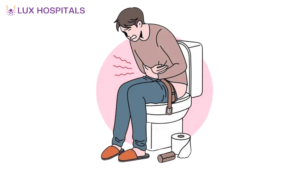Top 7 Signs You Should See a Proctologist Immediately

Due to embarrassment, rectal and anal health problems are frequently disregarded, although early detection could avert significant consequences. Maintaining your rectal and digestive health requires knowing when to consult a proctologist. These symptoms, which may include persistent pain or unusual bleeding, indicate that you need to see a doctor. This blog discusses the top 7 signs you should see a proctologist immediately, helping you take timely action for better health.
Recognize Rectal & Anal Warning Signs
Your body often gives subtle warning signs when something isn’t right with your rectal or anal health. Ignoring these symptoms can lead to discomfort or more serious medical issues. Understanding the clear indicators, it’s time to visit a proctologist, which can help you take timely action and prevent complications. From rectal pain and bleeding to bowel changes and irritation, each sign is your body’s way of asking for expert care and attention.
1. Persistent Rectal Pain
If you experience ongoing or severe pain in the rectal area, it’s one of the clear signs you should see a proctologist. This discomfort could be caused by haemorrhoids, fissures, abscesses, or even infections. Ignoring rectal pain may lead to underlying issues such as increasing inflammation or fistulas.
- Pain that lasts more than a few days needs attention.
- Discomfort while sitting or during bowel movements can indicate rectal issues.
- Home remedies may not be enough for chronic pain.
2. Rectal Bleeding
Another concerning indication that you should consult a proctologist is finding blood in your stool or toilet paper. Haemorrhoids may cause modest bleeding, but excessive or continuous bleeding may indicate fissures, polyps, or colorectal disorders. A proctologist’s advice ensures a precise diagnosis and suitable treatment. Another concerning indication that you should consult a proctologist is finding blood in your stool or toilet paper
- Bright red blood often indicates haemorrhoids or fissures.
- Dark or tarry stools may indicate more severe gastrointestinal bleeding.
- Always get medical advice if bleeding occurs more than once.
3. Changes in Bowel Habits
Sudden changes in bowel movements—such as constipation, diarrhoea, or irregular stool consistency—are significant signs you should see a proctologist. The rectal lining may become fissured or infected as a result of prolonged constipation or loose stools. Chronic gastrointestinal diseases can be prevented by early detection of their aetiology.
- Monitor frequency and texture of stools.
- Be alert for unexplained changes that persist for more than 2 weeks.
- Dietary adjustments might not resolve severe bowel irregularities.
4. Itching or Irritation Around the Anus
Persistent anal itching can be embarrassing, but it is often one of the most ignored signs that you should see a proctologist. This symptom could result from haemorrhoids, infections, or skin conditions like dermatitis. Proctologists can identify the underlying issue and recommend soothing treatments to restore comfort.
- Over-the-counter creams may only offer temporary relief.
- Anal hygiene and medical care are equally important.
- Persistent itching may indicate underlying rectal inflammation.
5. Lump or Swelling Near the Anus
Feeling a lump around the anal region is among the more serious signs that you should see a proctologist. Haemorrhoids, abscesses, cysts, or, in rare cases, tumours can cause lumps. Timely evaluation helps rule out infections or growths that may require surgical intervention.
- Lumps that are painful or growing need urgent attention.
- Never try to drain or treat anal lumps at home.
- Early detection helps prevent complications.
6. Involuntary Leakage or Difficulty Controlling Bowel Movements
Loss of bowel control or leakage, known as faecal incontinence, is a concerning sign that you should see a proctologist. This may result from muscle weakness, nerve damage, or chronic conditions like rectal prolapse. A proctologist can perform tests to determine the cause and suggest effective management techniques.
- Report even mild leakage to your doctor.
- Treatment may include pelvic floor therapy or minor surgery.
- Ignoring symptoms may lead to worsening incontinence over time.
7. Family History of Colorectal Diseases
If you have a family history of colorectal cancer, polyps, or other bowel diseases, it’s one of the preventive signs that you should see a proctologist. Regular screenings help detect early abnormalities before they progress into severe conditions. To maintain your rectal health, a proctologist may suggest a customised check-up program.
- When it comes to inherited colorectal illnesses, early detection saves lives.
- Colonoscopies and other screenings are essential for prevention.
- Discuss your family’s medical history with your specialist.
When Should You Book an Appointment?
If any of the above signs persist for more than a few days, it’s time to consult a specialist. Proctologists diagnose and treat rectal, anal, and colon-related issues using advanced tools and procedures. Early intervention can prevent discomfort and serious diseases.
Conclusion
You can avoid long-term rectal and digestive issues by being aware of the symptoms that indicate you should consult a proctologist. Timely medical intervention guarantees successful treatment and peace of mind for everything from rectal bleeding to chronic pain. Our skilled proctologists at Lux Hospital employ cutting-edge technology to carefully and precisely diagnose and treat all kinds of anal and rectal problems. Schedule an appointment with Lux Hospital today to begin your journey to improved rectal health with confidence.
Frequently Asked Questions
A proctologist is an expert in the diagnosis and treatment of disorders related to the rectum, anus, and lower digestive tract. They handle problems like haemorrhoids, fissures, fistulas, and rectal cancers. Proctologists use medical and surgical procedures to restore bowel and rectal health effectively.
You should see a proctologist if you experience symptoms like rectal bleeding, persistent pain, or bowel changes. These are significant signs you should see a proctologist and shouldn't be ignored. The earlier you seek treatment, the more likely you are to receive adequate care.
Proctologists may recommend tests like anoscopy, colonoscopy, or sigmoidoscopy to examine the rectal and anal canal. These procedures help identify internal bleeding, polyps, or other abnormalities. The tests are safe, minimally invasive, and essential for accurate diagnosis.
Home cures and dietary adjustments may help mild haemorrhoids, but chronic cases require medical evaluation. Persistent swelling, pain, or bleeding are signs you should see a proctologist immediately. Ignoring haemorrhoids can lead to complications or the need for surgical treatment.





















